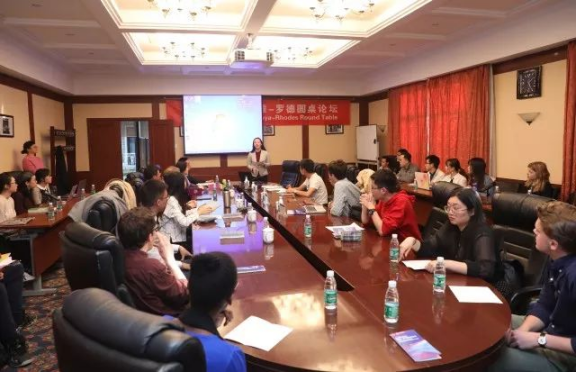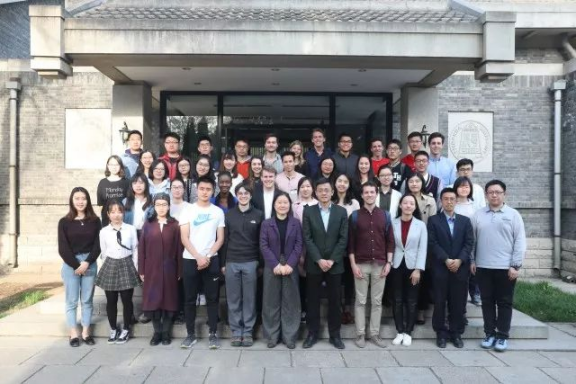On April 12, 2018, "Global Competence: Xinya-Rhodes Round Table" was held in a conference room of Tsinghua University. More than 30 Tsinghua students from Xinya College and other colleges and 14 Rhodes Scholars from the Oxford University exchanged ideas on topics such as global competence, Chinese and Western political systems and public policies, China's education reform, and the rural poverty alleviation mechanism. The round table was jointly presided over by Zhu Xinyu, a counselor of Xinya College, and Jiang Xilin, the convener of the delegation of Rhodes Scholars to China. Other attendees included Cao Li, a professor of Department of Foreign Languages and Literatures and Deputy Dean of Xinya College, Mei Ciqi, an associate professor of political science of the School of Public Policy & Management, and Zhang Weite, Head of the Student Work Group of Xinya College.

Scene of "Xinya-Rhodes Round Table"
Lian Yifan, a sophomore from Xinya College majoring in Economics and Finance, was the first to speak. Her speech was titled "Global Competence: Prepare for the Future". Based on her study at the London School of Economics and Political Science (LSE) in the summer vacation, she tried to explain that global competence is a methodology that is understood and practiced by contemporary college students in order to address the future global challenges, which needs be understood from cognition, willingness and method aspects.
Chen Zonghao, a freshman of Xinya College who planned to choose major of Electronic Information Science and Technology, discussed the impact of the selection system of high schools and universities on social mobility from the perspective of "silent revolution" induced by education reform. In his opinion, the current reform of college entrance examination evaluation methods in Shanghai and Zhejiang may lead to a decline of social mobility, and how to handle the contradiction between the two is the key to the reform. At the same time, the general education practice of Xinya College is enlightening to the reform of college entrance examination subjects.
Wang Jingshu, a sophomore of Philosophy, Politics and Economics, Xinya College, introduced the current situation and trend of China's targeted poverty alleviation campaign with the participation of the government, rural elite and farmers in policy orientation, market economy, specific measures and other aspects based on the cases of three villages in Shaanxi Province. She pointed out that the multi-subject interactive poverty reduction mechanism in rural China is promising.
In order to make Rhodes Scholars better understand China, the round table specially invited Mei Ciqi, an associate professor of political science of the School of Public Policy & Management, to instruct on "China's Political System and Public Policy". Mei Ciqi started from an analysis of institutional differences and similarities, and pointed out that Western democracy is not the only form. China's great achievements in the past 40 years since reform and opening-up illustrate the feasibility of a different governance model. He stressed that China's unitary state system does not exclude local autonomy. If democracy means achieving some consensus and reconciliation between different social strata and interest groups, the political system gap between China and the West is notas big as people think. Seeking common ground while reserving differences is the basis of cross-cultural exchanges.
Léo Bureau-Blouin, a Rhodes Scholar from Canada, shared his experience and understanding of the political system and social governance of Canada based on his own experience of being elected as the youngest member of Parliament in Quebec's history. He took the incident of the public opposing a 75% addition to tuition fees imposed by the Quebec government in 2012 as an example to illustrate the game and interaction between students, the public and the government and demonstrate the political aspirations and social organizational ability of young Canadian scholars.
Colin Higgins, another Rhodes Scholar from Wisconsin, the United States, described the characteristics and orientation of American politics in the Trump age from party politics, identity politics, populism movements and other aspects. He pointed out the necessity to understand the United States in the Trump age from the perspectives of structural, historical and social factors, such as American party structure, election law, races, strata, media and cultural traditions as well as the separation and expectation of various social forces.
The attendees had further discussions on their respective research interests and concerns. All of them expressed their desire for continuous dialogues and exchanges. Professor Cao Li of Xinya College said in her concluding speech that Xinya scholars and Rhodes Scholars both pursue extraordinary academic ability and the ability to serve and lead the society, which is the basis of exchanges and dialogues between the two sides. When we discuss global competence, we need first gain insight into the politics, economy, education and culture of our own country and other countries. The round table, involving Xinya's visit to the Oxford University and Rhodes Scholars' visit to Xinya College, the discussion on quantum mechanics and the speech on "Sailing to Byzantium", as well as Chinese and Western democracy and public policy, is an unforgettable journey of cross-cultural and cross-border learning and communication for every participant. Finally, Professor Cao, on behalf of Xinya College, expressed heartfelt thanks to all the teachers, students and guests who participated in the round table. Jiang Xilin, the convener of the delegation of Rhodes Scholars to China, also expressed heartfelt thanks on behalf of the Rhodes Trust to Tsinghua University and Xinya College. He expected that outstanding Tsinghua undergraduates from Xinya College and other colleges would actively apply for Rhodes Scholarship.
This round table was an activity of the "Visit of Rhodes Scholars to China (Tsinghua)" series. Rhodes Scholarship is committed to training future leaders with public consciousness. It was founded in 1902 by the British politician Cecil John Rhodes. The winners, called Rhodes Scholars, can pursue advanced studies at the Oxford University. The scholarship is opened to the Chinese mainland from 2015. So far, there are 12 Rhodes Scholars from the Chinese mainland, including two from Tsinghua University — Ren Naying and Chen Yuxuan, both of whom graduated from the English major, Department of Foreign Languages and Literatures.

Reported by: Kong Xiangrui, Yang Maoyi
Photographed by: Yang Yanbin